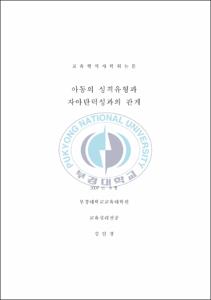아동의 성격유형과 자아탄력성의 관계
- Alternative Title
- Relationship between Children's Personality Type and Ego-Resiliency
- Abstract
- 본 연구에서는 아동들의 성격유형에 따른 자아탄력성의 차이를 알아보고자 한다.
이를 위해 본 연구에서는 부산시 수영구와 해운대구에 위치한 3개 초등학교 5,6학년 학생 180명을 대상으로 하여 성격유형과 자아탄력성을 측정하였다. 측정도구로는 1990년 미국의 Meisgeier와 Murphy에 의해 개발되고, 한국에서는 1993년 김정택과 심혜숙에 의해 표준화된 아동용 심리유형검사(MMTIC:Murphy-Meisgeier Type Indicator for Children)을 사용하였다. 자아탄력성을 측정하기 위해서는 Block과 Kremen(1996)이 개발한 자아-적응유연성 척도(Ego-Resiliency Scale)를 유성경(2004)이 번안 수정·보완한 것을 사용하였다. 먼저 연구대상 아동들의 성격유형과 자아탄력성을 살펴보고, 외향형-내향형, 감각형-직관형, 사고형-감정형, 판단형-인식형의 성격유형에서의 선호경향에 따른 자아탄력성의 차이와 감각적 사고형, 감각적 감정형, 직관적 사고형, 직관적 감정형의 네 가지 심리적 기능유형에 따른 자아탄력성의 차이 비교를 위해 일변량분산분석(ANOVA)을 실시하였다.
연구결과는 다음과 같다.
첫째, 아동의 자아탄력성이 선호경향에 따라 부분적으로 유의한 차이가 있음을 밝히고 있는데, 외향형, 감정형, 직관형이 내향형, 사고형, 감각형에 비해 자아탄력성이 유의미하게 높은 것으로 나타났다.
둘째, 네 가지 기능유형에 따라 아동의 자아탄력성 유의한 차이가 있는지 살펴본 결과, 부분적으로 유의한 차이가 있었다. 감각적 사고형, 감각적 감정형, 직관적 사고형은 유사하게 나왔으나 직관적 감정형은 유의하게 높게 나왔다.
본 연구 결과에 따르면 내향형, 사고형, 감각형의 아동이 자아탄력성이 낮은 것으로 드러났는데 이러한 결과는 이 유형의 아동들을 위해 가정이나 학교 현장에서 자아탄력성이 낮은 아이들을 이해하고 지도할 수 있도록 학부모나 교사를 위한 교육 프로그램 계발이 필요함을 시사한다.
The study was designed to lay the ground for effective guidance toward adaptive coping behavior by finding out differences in ego-resiliency between personality types in the Murphy-Meisgeier Type Indicator for Children(MMTIC) and by understanding the cause of children behavior and attitude personality type.
For the study, personality types and ego-resiliency of 180 fifth and sixth-grade students from 3 elementary schools that is located in suyoung-gu and haeundae-gu, Busan were measured. The measuring instrument was MMTIC, which was developed by Meisgeier and Murphy in the US in 1990 and standardized in Korea in 1993 by Jungtaek Kim and Hyesook Shim. In order to measure Ego-Resiliency, I used Block & Kremen(1996)'s Ego-Resiliency scale that is translated and remodified by Sungkyung Yoo (2004). ANOVA were conducted to compare differences in ego-resiliency that is based on children's preference for personality types, that is, Extraversion - Introversion, Sensing - iNtuition, Thinking - Feeling, Judging - Perceiving. Also, compared item was differences in ego-resiliency between four function types - ST(Sensing/Thinking), SF(Sensing/Feeling), NT(iNtuitin/Thinking) and NF(iNtuition/Feeling).
The study found the following: First, the result showed that in participants personality type, Extraversion type indicated higher rating than Introversion did. Also Sensing ranked higher than iNtuition did. This result is differentiated from the previous research. Second, the difference between children's ego-resiliency score is significant in some part. According to the children's preference for personality types, participants' ego-resiliency score appears significantly higher in Extraversion, Feeling and iNtuition than in Introversion. This result, therefore, supports the goal of the study that investigates whether there is a significant difference in ego-resiliency between Extraversion and Introversion-types children. Third, the study examined whether there is a significant difference in ego-resiliency between four function types of children and found that NF-types children showed significantly higher ego-resiliency score among four types.
In conclusion, Introversion, Thinking, Sensing types of children showed lower ego-resiliency than the other types did. The finding implicates that we need to develop a program for parents and educators, in order to understand and teach lower ego-resiliency children both on a family basis and in the field of teaching.
- Issued Date
- 2007
- Awarded Date
- 2007. 8
- Type
- Dissertation
- Keyword
- 성격유형 자아탄력성 아동 Ego-Resiliency Personality Type
- Publisher
- 부경대학교 교육대학원
- Alternative Author(s)
- Kim, In-Kyung
- Affiliation
- 부경대학교 교육대학원
- Department
- 교육대학원 교육심리전공
- Advisor
- 이정화
- Table Of Contents
- Ⅰ. 서론 = 1
1. 연구의 목적 및 필요성 = 1
2. 연구문제 = 5
3. 용의 정의 = 6
Ⅱ. 이론적 배경 = 7
1. 아동용 심리유형검사(MMTIC)에 의한 성격유형 = 7
2. 자아탄력성 = 20
3. 성격유형과 자아탄력성 간의 선행 연구 고찰 = 23
Ⅲ. 연구방법 = 27
1. 연구대상 = 27
2. 측정도구 = 28
3. 연구절차 = 30
4. 분석방법 = 31
Ⅳ. 연구결과 = 32
1. 기초자료 분석 = 32
2. MMTIC의 각 선호경향에 따른 아동의 자아탄력성의 차이 = 35
3. 기능유형에 따른 아동의 자아탄력성의 차이 = 36
Ⅴ. 논의 및 결론 = 38
1. 논의 = 38
2. 결론 = 42
참고문헌 = 44
설문지 = 48
- Degree
- Master
- Files in This Item:
-
-
Download
 아동의 성격유형과 자아탄력성의 관계.pdf
기타 데이터 / 733.03 kB / Adobe PDF
아동의 성격유형과 자아탄력성의 관계.pdf
기타 데이터 / 733.03 kB / Adobe PDF
-
Items in Repository are protected by copyright, with all rights reserved, unless otherwise indicated.